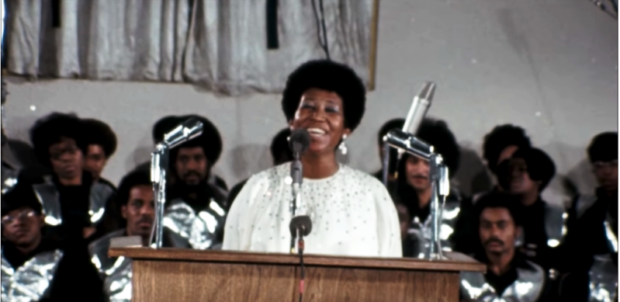
 In the early 1970s, at the peak of her powers and her success, Aretha Franklin decided that she wanted to make a gospel album, going back to the music with which she had first launched her singing career when she was a girl. She could have done it in a studio, but she wanted to record in a church, with an audience, because the response of a crowd adds so much to the beauty and intensity of a gospel concert. So in January of 1972, at the age of 29, Franklin performed for two nights with the backing of the great James Cleveland, one of her mentors, and the Southern California Community Choir, at The New Bethel Baptist Church in the Watts neighborhood in south Los Angeles. The album was produced—it was called “Amazing Grace,” and it’s the most popular black gospel album in history, along with being the biggest selling album in Franklin’s entire career, which is really saying something.
In the early 1970s, at the peak of her powers and her success, Aretha Franklin decided that she wanted to make a gospel album, going back to the music with which she had first launched her singing career when she was a girl. She could have done it in a studio, but she wanted to record in a church, with an audience, because the response of a crowd adds so much to the beauty and intensity of a gospel concert. So in January of 1972, at the age of 29, Franklin performed for two nights with the backing of the great James Cleveland, one of her mentors, and the Southern California Community Choir, at The New Bethel Baptist Church in the Watts neighborhood in south Los Angeles. The album was produced—it was called “Amazing Grace,” and it’s the most popular black gospel album in history, along with being the biggest selling album in Franklin’s entire career, which is really saying something.
But along the way, in preparing for this event, Aretha also agreed to let Warner Brothers Studios film it, for theatrical and television release. The director was Sidney Pollack, one of Hollywood’s best, but he had never shot a concert film before. He made one big mistake, not separating the shots with clapper boards—which within the confines of the very modest sized church might not even have been feasible—and so afterwards, with the limited technology available to him in the 70s, he was unable to synch the music and the voices to the images. The film ended up languishing in the Warners vault, until 2007, when producer Alan Elliott purchased the raw footage and used advanced digital technology to successfully synch sound and image. But when he attempted to release the film in 2011, Aretha Franklin refused permission. We don’t know why. Maybe we’ll never know. But after Franklin’s death last year, her family authorized Elliott to go ahead. So now, 47 years after the concert, we finally get to see the film which is titled, like the album, Amazing Grace.
The movie builds up to Aretha’s appearance with an introduction by James Cleveland, who emphasizes that this is indeed a church service, and encourages those who feel the spirit to express it. Then the Queen of Soul appears, and from the first notes that she sings, with the accompaniment of a full gospel choir, you may get goose bumps. Those who are already familiar with the album have reported having chills and shedding tears upon seeing the images matching the music. I’m almost ashamed to admit I’ve never listened to the album, so you can imagine its effect on me, hearing it all for the first time. And one of the marvelous things about black gospel is that even if you’re not religious, the music can create a feeling of awe. In this case, it’s conveyed by one of the greatest voices of the century, whose notes soar higher than you can dream of, and whose pacing and rhythm is all her own. The title song, “Amazing Grace,” which ends the first half, sees her holding the song’s syllables in the air longer than the singers and musicians can keep up with, while the crowd erupts in an outpouring of love and ecstasy.
The church only seated a few hundred people, and in this intimate setting we see the young Franklin at her most vulnerable. The camera rarely pulls away from her face, streaming with sweat, as she works to attain the greatest heights of emotion music can attain. The film’s last half is from the second show the following night, and here her father, a Detroit minister and a gospel singer himself, is in the audience, even taking the stage to provide a brief glimpse into Aretha’s childhood and faith. The final number, entitled “Where We’ll Never Grow Old,” makes people move out of their seats, shaking their heads, as if to say, “How can any singer make such a beautiful sound?”
Along with joy, there’s a bit of sadness. Amazing Grace shows us a once-in-a-lifetime event, but now Aretha Franklin is gone from us. And the film makes us miss her more than ever.






